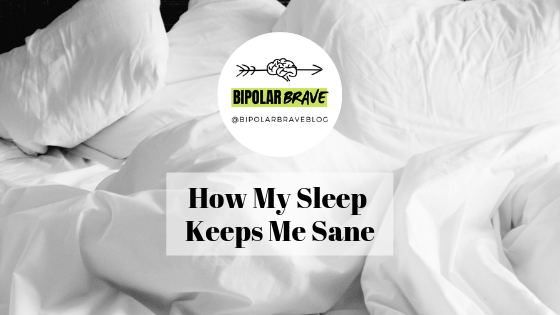I shared with you how my favorite self-care activities help keep me from sliding back into a bipolar episode, aside from managing my medication. I want to start to share with you on a deeper level how each of those keep me sane, starting with healthy sleep hygiene.
There is some great research done that shows us how much sleep is imperative to our health. I am sure you’ve heard that for most adults, it’s recommended we get an average of 6-8 hours of sleep a night. The adult with a mood disorder or mental health condition should take heed: good sleep equals good mental health.
You may struggle with this, especially if your disorder keeps you from that sleep. In that case, I highly recommend talking to your doctor and psychiatrist to discuss what they can offer in terms of sleep medicine or supplement to assist you to get to sleep. In other practical ways, try applying the following tips and you could very well see and sleep the difference:
Exercise.
Daily is ideal, and most days is great. There is something to be said for tiring your body out, even if it’s a couple hours before bed. Not getting enough physical activity can hinder the eustress (good stress) that uses up energy that in turn makes us feel physically and sometimes even mentally tired. Again, talk with your doctor before starting up a new routine.
Diet.
Consider what food you eat during the day, especially near bed time. When you eat a heavier meal at night, you are storing calories that aren’t going to be immediately used. This isn’t the healthiest, but at least having a light snack before bed so that your stomach isn’t bothering you as you try to get to sleep can curb that appetite and potential for midnight snack cravings.
Cut back on caffeine.
Try this – not cold turkey though. Cut back gradually, especially if you’re a soda or coffee fiend. Decrease a cup of coffee a day, until you’re down to two in the morning. Don’t consume caffeine beyond noon. Feeling fatigued if you’re lacking that afternoon surge? Try going for a walk on your lunch break. Eat a handful of nuts. Using energy begets energy.
Eliminate screen time before bed.
If you are consistently looking at the phone or computer screen up until it’s time to sleep, you aren’t preparing your mind for the quality sleep it needs. Put the phone down and on a Do Not Disturb mode if you have to. Store your computer in another room, and don’t bring it to bed. There are studies that show the benefits of eliminating screen time before bed.
Pray and meditate.
Have something on your mind? Talk to God about it. Get it off your chest and think on what is “true, noble, honest, trustworthy…excellent and praiseworthy.” (Philippians 4:8) Tell the Lord how hard a time you’re having, and then listen for His Spirit to respond. Nothing? Read some of His word.
Read.
Whenever I am having a hard time going to sleep, I just have to pick up a book and try reading. This is fine, and can help pass the time it takes to get to sleep. Just try for something that isn’t highly suspenseful or thrilling. Non-fiction help books are my preference.
Sing a song in your head.
So I don’t usually do this, but sometimes the song in my heart after a busy day is sung in my head. The tune can be a song I heard on the radio, or sometimes I can improvise and make up a melody in my mind. I like to do this to express my mood. It’s therapeutic and can put me to sleep.
Talk to your spouse.
If you’re married, consider having a conversation with your spouse. Tell them you’d like them to just listen (especially if you’re a wife speaking to your husband). Share the concerns and matters on your heart. When I share my heart with my husband and he listens to my concerns late at night, I feel like I can sleep better, knowing he heard me out.
Stay brave and bold,
Katie









What do you think?